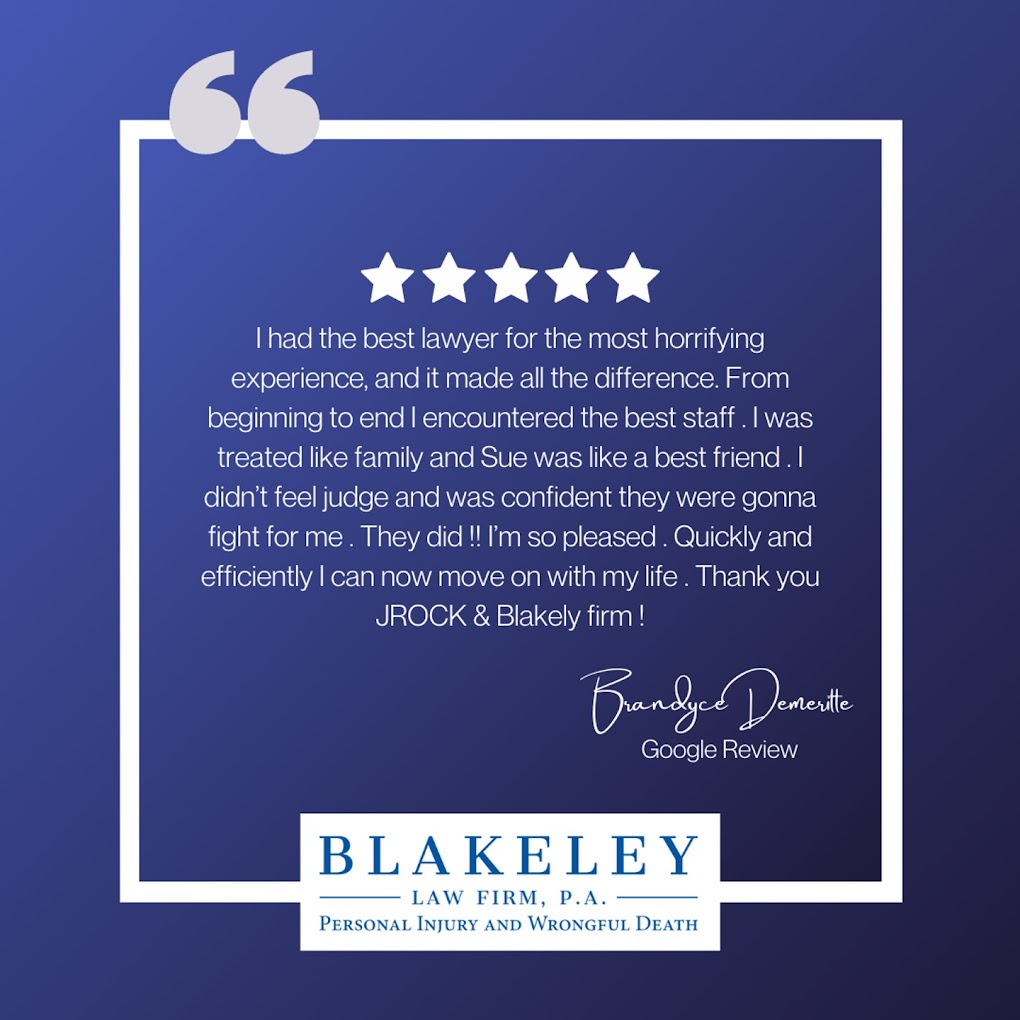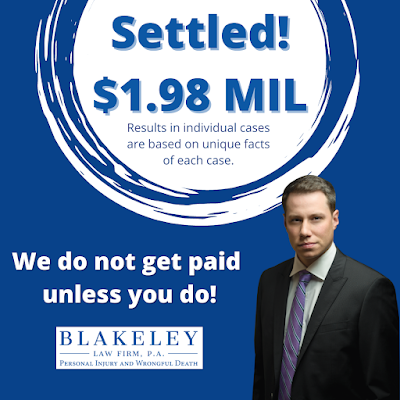A traumatic brain injury fills your life with challenges that reshape your future.
Each day, in the United States, over 600 victims receive traumatic brain injuries, with another 170 succumbing to the repercussions of TBI-related causes. Yet, hidden beneath these alarming statistics lies a darker truth: many TBIs remain concealed, lurking in the shadows of unreported cases.
As this silent epidemic persists, untreated TBIs can cast a cloud of uncertainty over the lives of those affected.
All too often, a personal injury attorney is the only hope for regaining a semblance of your previous life after someone's negligence causes a TBI.
If you suspect that you may have experienced a traumatic brain injury following a car collision, a slip and fall, or another dangerous incident, the Blakeley Law Firm stands ready to offer our guiding hand.
Our seasoned Fort Lauderdale personal injury attorneys boast a legacy of decades spent aiding folks thrust into the abyss of negligence-induced turmoil.
We get the overwhelming frustration of such distressing events and are determined to maximize your compensation and alleviate your burdens. Your journey to recovery begins here, where legal skill meets hope. Reach out to a Fort Lauderdale traumatic brain injury attorney.
Reach Out Today!
Why Choose Blakeley Law Firm?
The Blakeley Law Firm represents TBI victims in Fort Lauderdale with skilled legal protection.
With a stellar track record spanning over a decade, our accomplished legal team concentrates on handling high-value accidents and supporting victims’ rights to compensation.
We provide:
Experience in your case
Victims usually require legal assistance to restore normal life and protect their rights after a TBI. Blakeley Law Firm litigators assist with hectic legal issues, like dealing with health insurance adjusters and determining liability.

We have the experience and skill to investigate and advocate your traumatic brain injury case in Fort Lauderdale and surrounding counties.
Convenient locations
Blakeley Law Firm is easy to find, with four conveniently located offices. Our Fort Lauderdale office is at 1451 West Cypress Creek Road #300.
We emphasize the importance of transparency and accessibility during the legal process and understand how important it is to meet deadlines, protect essential evidence, and build a case that gives you confidence.
No out-of-pocket expenses
You are our top priority, so we never ask for any upfront money. We don’t think accident victims should bear any financial burden, so, just like you, we wait for the settlement to get paid.
Our initial legal consultations are always free, ensuring you can explore your legal choices without worrying about how to make a payment.
Se habla Español
We take pride in serving diverse communities and provide our services in English and Spanish, so we communicate with you in the language that makes you feel most comfortable.
When you pick Blakeley Law Firm, you get a team that knows the law, cares about you, and is determined to get you the compensation you should have.
Contact us for your free consultation today. Let the Blakeley Law Firm stand by your side on the path to good health and justice.
Check out our testimonial page to see why clients are thrilled with our work
The reviews from the Blakeley Law Firm clients consistently highlight our dedication to client well-being, transparent communication, assertive advocacy, and overall professionalism.
Many clients specifically mention the unwavering support and guidance they receive throughout the legal proceedings, often describing Mr. Blakeley and his team as treating them with the warmth and care one would expect from family.
Clients express their gratitude for how easily they can contact the firm, the regular and informative updates they receive, and the valuable assistance the readily available and highly experienced team members provide.
What is a Traumatic Brain Injury?

A traumatic brain injury (TBI) happens when an outside force or trauma disrupts normal brain function. TBIs can have both short-term and long-term effects on an individual’s cognitive, emotional, and physical well-being.
Common causes of traumatic brain injuries include accidents such as car accidents, falls, sports-related injuries, and assaults. It can lead to brain damage when an accident jostles the brain around inside the skull.
These injuries may involve:
- Concussion: A TBI often caused by a blow to the head or violent shaking. Concussions may cause temporary loss of consciousness, confusion, and memory problems.
- Contusion: A bruise on the brain’s surface caused by a direct impact to the head.
- Diffuse Axonal Injury (DAI): Widespread damage to the brain’s nerve fibers (axons) due to rotational forces or violent shaking causes DAI which can lead to coma or long-term cognitive impairment.
- Penetrating injury: When an object pierces the skull and damages brain tissue. This type of TBI often has severe consequences.
It’s essential to take precautions to prevent TBIs by wearing seat belts, using helmets during sports activities, and maintaining a safe environment to reduce the risk of accidents that could lead to brain injuries.
Common Causes of TBIs
Traumatic brain injuries (TBIs) can result from various causes, but some of the most common ones include:
- Falls: Slip and fall accidents are the top cause of TBIs, especially among children and older adults. These can occur at home, on staircases, sidewalks, or workplaces.
- Motor vehicle accidents: Car, motorcycle, bicycle, and pedestrian accidents significantly contribute to TBIs. The force of impact during a collision can result in head injuries.
- Sports and recreational activities: Contact sports like football, soccer, and hockey, and activities like biking, skateboarding, and skiing can lead to TBIs, especially without protective gear or disobeying the rules.
- Assaults: Physical assaults, including fights and domestic violence, often involve blows to the head, leading to traumatic brain injuries.
- Employment-related injuries: Certain occupations, such as construction and manufacturing, pose a higher risk of TBI due to the potential for falls, falling objects, or other workplace accidents.
- Explosive blasts: Military personnel and individuals exposed to explosions, such as those in combat zones or industrial affairs, can suffer blast-related TBIs.
- Penetrating injuries: Objects like bullets, knives, or sharp objects can penetrate the skull and directly damage brain tissue, causing TBI.
- Sports-related concussions: Even in non-contact sports, concussions can occur due to accidental collisions or impacts to the head.
Traumatic brain injuries (TBIs) are often the direct result of someone else’s negligence, especially in circumstances like car accidents, slip and falls, or workplace incidents.
Failure to adhere to safety regulations, reckless behavior, or inadequate precautions can all contribute to the occurrence of TBIs. When negligence is a factor, legal recourse may be available for TBI victims to seek compensation and hold responsible parties accountable for their actions or inactions.
The Blakeley Law Firm has the experience in TBI cases you need to get the best chance of an adequate settlement. We utilize our experience, legal skills, and familiarity with the Fort Lauderdale legal system to fight for your rights to compensation.
Symptoms of Traumatic Brain Injury
Traumatic brain injuries (TBIs) can manifest with a long list of symptoms. Their severity varies depending on the extent of the injury.
Common TBI symptoms include:

- Headache: Persistent or severe headaches.
- Confusion: TBI can cause confusion, disorientation, difficulty concentrating, and memory loss.
- Nausea and vomiting: Some people with TBI experience nausea and may vomit, especially in the immediate aftermath of the injury.
- Dizziness and balance problems: TBI can lead to difficulties with balance, coordination, and dizziness.
- Blurred vision: Vision problems, including blurred or double vision, can occur after a TBI.
- Sensory changes: Changes in the senses may occur, such as sensitivity to light or noise.
- Fatigue: Excessive fatigue or tiredness is common in TBI cases.
- Mood changes: TBI can cause mood swings, irritability, and emotional disturbances.
- Cognitive issues: TBI patients often experience memory problems, difficulty concentrating, and impaired thinking abilities.
- Slurred speech: TBI can affect speech, resulting in slurred or slowed speech patterns.
- Sleep disturbances: Sleep problems, including insomnia or excessive sleepiness, may be present.
- Loss of consciousness: In some cases, TBI can lead to a loss of consciousness, ranging from a few seconds to an extended period.
- Seizures: Seizures can occur in some TBI cases, especially in more severe injuries.
- Weakness or numbness: Muscle weakness or numbness in extremities could manifest.
Symptoms can appear immediately after the injury or develop gradually over hours or days. Some people with mild TBIs, like concussions, might not lose consciousness but still experience some symptoms.
If you suspect you or someone you love has TBI, it’s imperative to seek medical attention promptly for evaluation and appropriate care.
Do I Need a Lawyer to File a Traumatic Brain Injury Claim?
The complexities surrounding TBI cases, coupled with the challenging legal landscape, make hiring a Fort Lauderdale brain injury lawyer a decision that can profoundly impact the outcome of your claim.
TBIs encompass a broad spectrum of injuries. The complexity of TBI cases lies in the intricacies of medical diagnosis, treatment, and the long-term impact on the victim’s life.

Proving the connection between the injury and the responsible party’s actions can be challenging, especially when dealing with subtle or delayed symptoms.
This is where legal knowledge becomes invaluable:
Navigating legal procedures
Filing a TBI claim involves several legal procedures, including compiling evidence, negotiating with insurance companies, and potentially pursuing a lawsuit.
Without legal guidance, TBI victims can struggle to navigate these complex processes, leading to mistakes that weaken their case.
Our attorneys are well-versed in the legal requirements and timelines, taking all necessary steps to protect your rights.
Determining liability
Establishing liability is crucial to any personal injury claim, including those related to TBIs. Lawyers can conduct thorough investigations to identify responsible parties and build a strong case against them.
Whether it’s a negligent driver in a car accident, a property owner in a slip and fall incident, or a manufacturer of defective equipment, attorneys have the skill to pinpoint liability.
Maximizing compensation
One of the primary goals in filing a TBI claim is to obtain fair compensation for medical expenses, lost income, pain and suffering, and long-term care costs. An experienced Fort Lauderdale brain injury lawyer can accurately assess the value of your claim, ensuring that you seek an appropriate settlement or, if necessary, take the case to court to pursue the compensation you deserve.
Overcoming insurance challenges
The primary objective of insurance companies is to minimize payouts, making dealing with them a daunting task. In fact, some companies even earn substantial bonuses for keeping those payouts as low as possible.
Insurers employ various tactics to reduce or deny your claim, such as disputing the severity of your injuries or offering lowball settlements.
An attorney with experience in TBI cases knows how to handle these challenges, advocating for your rights and protecting you from unfair insurance practices.
Related article: Fighting the Insurance Company After a TBI
Access to medical experts
TBI cases often require medical professionals to assess the extent of the injury, project future medical needs, and establish a direct link between the injury and the incident in question.
Attorneys have access to myriad medical professionals who can provide knowledgeable opinions and testify on your behalf, bolstering your case.
Peace of mind and emotional support
TBI claims can be emotionally draining for both the victim and their family. Having a dedicated attorney allows you to focus on your healing while they handle the legal complications. Attorneys also offer emotional support during a difficult and uncertain time.
An experienced Fort Lauderdale traumatic brain injury attorney is your advocate, guiding you through the process and ensuring that your rights and best interests are protected as you pursue the compensation and support you need to renovate your life after a traumatic brain injury.
Call Our Fort Lauderdale Personal Injury Lawyers for Your Free Consultation

Injured and not sure where to start?
The Blakely Law Firm PA team is here to help. We’re dedicated to swiftly securing compensation for TBI victims. Reach out to a Fort Lauderdale personal injury lawyer.
Call (954) 253-9445 for a free consultation, and we can assess your case.